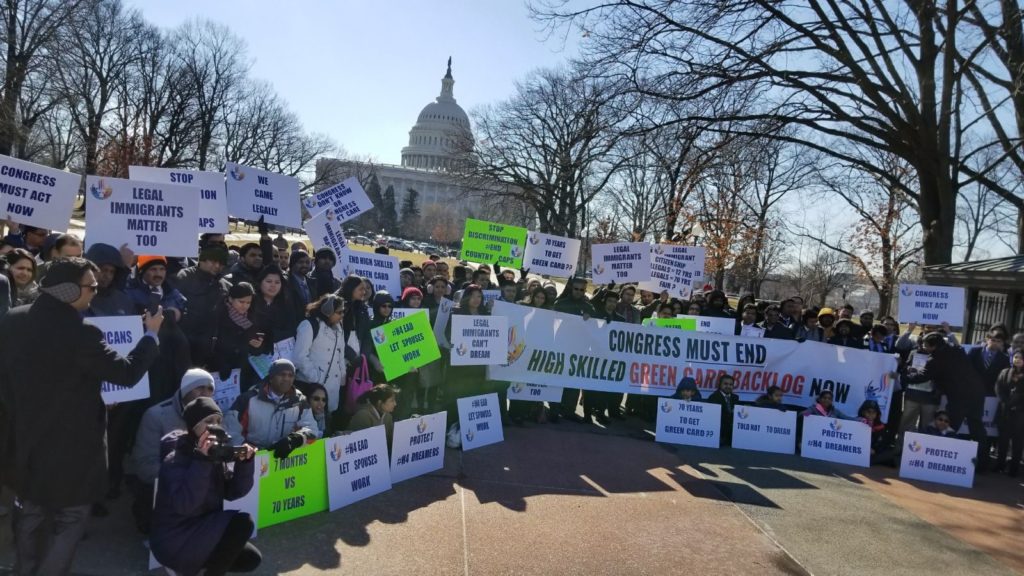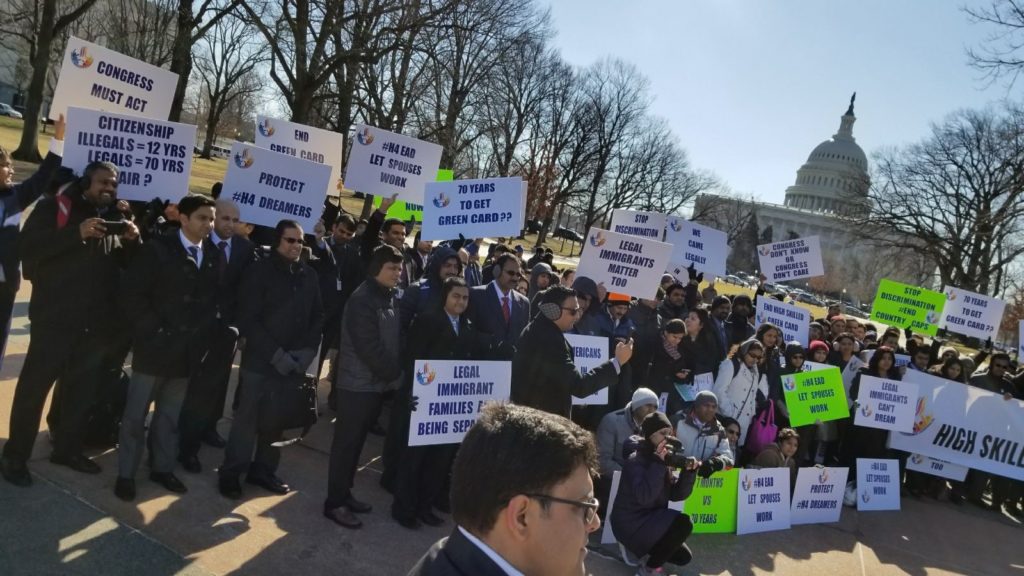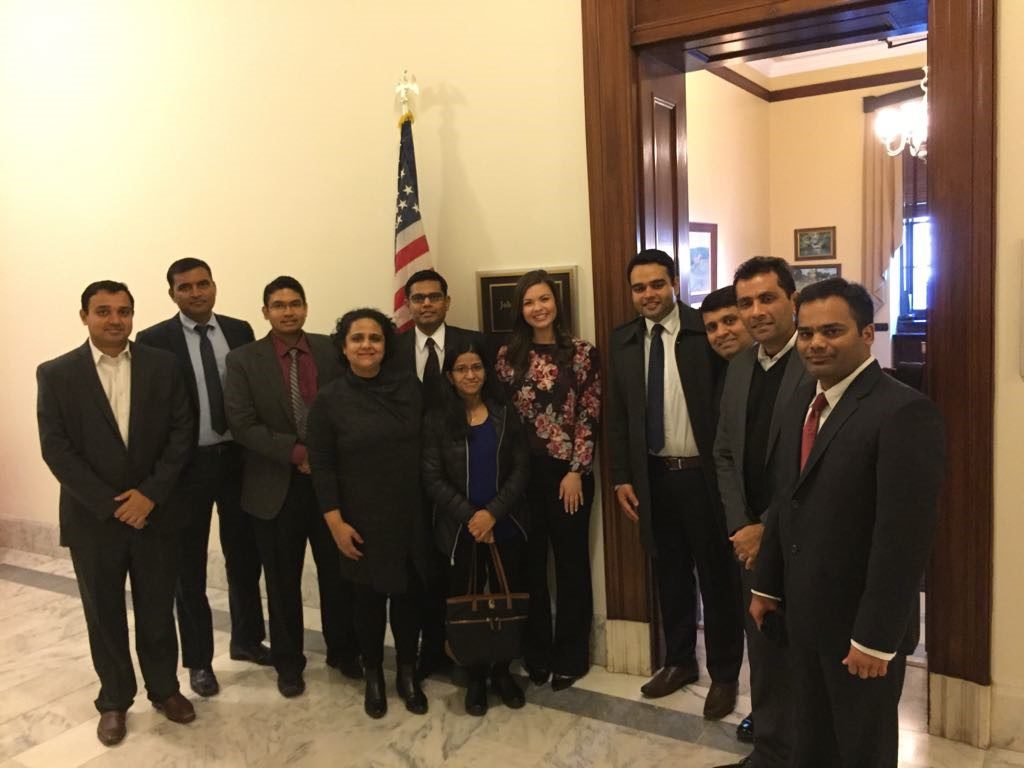10,420 people reached on Lassi with Lavina FB page – 491 post clicks – 196 link clicks
Aradhya Roy and 4 others like it on Lassi with Lavina FB page
210 views on LinkedIn

Immigrant Tales – H4 Visa A Reversal of Fortune
An American Life, Interrupted…
[dropcap]W[/dropcap]elcome to America, H1 B visa holder! Thousands of you here from India, all undergoing similar experiences and dreams….
Learning to use a metrocard and the vast confusing subway system; holding your pizza slice the right way and calling it a ‘slice’; driving on the right side of the road; learning to wash your clothes in a coin-operated washing machine at the Laundromat; watching a baseball game and eating a hot dog, perhaps for the first time; standing up for the Star-Spangled Banner and finding you love the words, the cadence.
These are some of the excitements of the American learning curve as you create a new life, working long hours, often without extended family, but loving every moment of it because you are setting your future, your dreams in motion. You work at your job, you can drive and you have your bank account and your own social security number. The final goal for a H1 visa holder is a Green Card which allows them to permanently live in the US and live the American life.
That is where the dream gets a bit hazy and obscure for the Green Card is increasingly hard to get, almost a mirage in the desert.
As Suneeta Dewan of Dewan & Associates, PLLC, an immigration law firm in New York, points out, the Green Card can take several years to come through. She says, “Indian priority dates are so badly backlogged because there are so many Indians applying for the H1B visa. Quotas should represent the size of the country but they don’t. So India has the same quota as some small African nation and the system is so clogged that Indians have to wait 10-15 years for the Green Card and in the meantime the children age out. “

[dropcap]W[/dropcap]hile waiting for the almighty Green Card, the life of the spouse of an HI B visa holder is quite different and not quite as promising. She lives on the periphery of the American Dream with the H4 visa, a caged bird who cannot fly or soar to new opportunities. For years these spouses lived in America and yet not in America for they were not allowed to work or have a professional life in spite of having been earning professionals in their home countries. They could not have a driver’s permit, a bank account or a social security number.
Since most dependent spouses are women – their lives in America were very restricted. In India they may have worked or driven but in this new country they had new restraints. And if they happened to be in a bad marriage where there was domestic abuse, they were further powerless and fearful of reporting, since they and their children were financially dependent on the working spouse. Dewan, who represents many such women on behalf of Manavi, the New Jersey-based group against domestic violence, has seen many such cases where women on H4 visas have been abused by their husbands.
Then in 2015 during the Obama Administration, the H4 spouses got a life-saver, a gift: the eligibility to work in the US while the H1 B visa holder waited for Permanent Residency status. According to a recent study by the Migration Policy Institute, the U.S. has issued employment authorization documents to more than 71,000 spouses of H-1B visa holders, over 90 percent of whom are Indians.
Here are details of the H4 EAD from the US Citizenship and Immigration Services
On February 26, 2015, USCIS hosted a teleconference about new regulatory changes, effective May 26, 2015, that extended eligibility for employment authorization to certain H-4 dependent spouses of certain H-1B nonimmigrants who have already started the process of seeking employment-based lawful permanent resident status. Those eligible include H-4 dependent spouses of principal H-1B nonimmigrants who:
• Are the principal beneficiaries of an approved Form I-140, Immigrant Petition for Alien Worker; or
• Have been granted H-1B status in the United States under the American Competitiveness in the Twenty-first Century Act of 2000 (PDF) as amended by the 21st Century Department of Justice Appropriations Authorization Act (AC21). Under AC21, certain H-1B workers seeking employment-based lawful permanent residence may be eligible to work and remain in the United States beyond the six-year H-1B period of admission limitation.
The H4 EAD – a temporary employment authorization – has transformed the lives of many H4 spouses, allowing them to work, drive and have an independent life. These families have been able to plan for the future, buy a home and have expanded dreams on two incomes, all the while contributing to the economy and to the talent pool and skills set in America.
American Lives Interrupted
[dropcap]A[/dropcap]nd now just as suddenly this right to work may be taken away by the Trump Administration, which is planning to rescind this two-year-old work visa, and it is said this could impact more than 70,000 h-4 EAD visa holders and their families, the majority of whom are Indians and mostly women.
“Our plans include proposing regulatory changes to remove H-4 dependent spouses from the class of aliens eligible for employment authorization, thereby reversing the 2015 final rule that granted such eligibility,” wrote U.S. Citizenship and Immigration Services (USCIS) Director Francis Cissna in a letter to Senator Chuck Grassley quoted in BloombergQuint.
And so now the spouses of H1 B visa holders once again are in limbo, their lives once again in turmoil as they wait for the other shoe to drop.
Can the lack of a piece of paper diminish, suffocate, and etch life in black and white?
It can and it does when it is the H 4 EAD.
As the Huffington Post noted, “But in line with President Donald Trump’s “America-First” philosophy, the White House has promised to crack down on the H-1B visa program, which critics say has been abused in order to displace American-born workers. In conjunction with that push, the Trump administration is also seeking to reverse the Obama-era policy allowing H-4 spouses to work.”

[dropcap]F[/dropcap]or Rashi Bhatnagar of Atlanta, a journalist who came to India with her husband on a H1 B visa, the news of the possible revocation has turned her life upside down. In spite of living in the US for nine years, the precious Green Card has yet to materialize. She says: “As per the calculations, the Green Card might take 70 years to arrive. Our lives are in a great jeopardy. We really want the administration to clear the Green Card backlog, because it is the root cause of our plight.”
She believes that revoking H4 EAD will definitely destroy lives of many H4 visa holders. The H4 EAD Rule should be retained or a permanent immigration solution should be given by the Administration. Bhatnagar says, “They could give unused visa numbers to clear the green card backlog, remove the dependents from the Green Card line or give an early adjustment of status.”

[dropcap]I[/dropcap]n the meantime, to create awareness of the problems facing H4 Visa families, she has turned advocate and has created a Facebook support page – https://www.facebook.com/H4visaacurse/ . It deals with the H4 ( Spouses and non – US born aging out kids who are stuck on a dependent visa.) The clock is ticking and as they wait for green cards to come through, many of the waiting children are turning into adults. Once they are 21, they can no longer be a part of the family Green Card application and will be sent back to their original home which they may have little memory of – India.
Many of the spouses on H4 visas have turned advocate as they seek to bring awareness to their plight. The active groups include Save H4 EAD and Skilled Immigrants in America (SIIA) which have been working with US legislators to create awareness of their case and get action. As the SIIA site notes these immigrants contribute billions of dollars into the US economy through local and federal taxes, by buying local products and services and yet cannot change jobs or start businesses, resulting in ‘indentured servitude’.
The SIIA GA team met with the officials from the offices of GA Senators Johnny Isakson and David Perdue in Washington DC and were also part of a 500 strong event of skilled immigrants in DC who met with legislators.
Here are some of the stories of H4 visa holders whose lives will be affected if the EAD is rescinded.

The Big Data Engineer Who Became Jobless
[dropcap]P[/dropcap]oornima (last name withheld) grew up in Hyderabad. A merit student, she was devoted to her books and to academics. Finding a job in the recession of 2003 was hard but she impressed the interviewers with her technical skills and managed to jump-start her career in the software industry. Her hard work got her three awards recognizing her contributions to the company where she worked for five years.
Marriage and her husband’s posting brought her to the US in 2009 and she left behind her successful career as software engineer. “Being on an H4 visa with no permit to work, I couldn’t use my previous experience to get a job. I have lost my freedom, felt very discouraged, it was the toughest phase of my life,” she recalls. “I couldn’t take this anymore hence decided to do masters. Trust me, it was not an easy decision with the responsibility of taking care of a 1-year-old baby. I used sleep at 1 in the night and get up at 4:30 in the morning so that I could get some time to prepare for my exams.”
With continuous hard work and dedication, she managed to get good scores in GRE and TOEFL, and did her master’s from the University of Texas, Dallas, majoring in Data Science. She says, “The road was not smooth yet, I worked hard for 2 years to graduate as an honor student. During this time the EAD rule came into reality. I didn’t apply for OPT as I had faith in the USA government that once a rule is made through proper procedure it will be there.”
From 2017 after her graduation, almost after 8 years of constant hard work, she started working as a Big Data Engineer with a Fortune 500 company. This is the dream job of a Data science major – but now this dream may be receding for Poornima.
She says, “With the new proposal to revoke H4 EAD, it is difficult to digest that this is happening. All my struggles and the sacrifices of time not spent with my child, energy, everything will be wasted. If I had made the same effort in a country where these kind of regulations are not imposed on dependents, my life would have been in a better position.”
The future looks bleak since Poornima did not opt for filing OPT before graduating – that opportunity is now lost. She voices the fears which inhabit her waking hours: “If EAD is revoked I will be jobless. I will be back to the stage where I started my journey in the USA nine years ago. I need to pay back my education loan and I really don’t know what to do next. I am doomed. My life is in jeopardy.”

The Breadwinner Who Couldn’t Win Bread
[dropcap]R[/dropcap]aj Karne lives in Minneapolis Minnesota, and his life is held in thrall by the reversal of the H4 EAD rule. Unlike most men, he came here on H4 dependent visa while his wife had the H1 B visa in July 2011.
“We were newly married then and both did not know the restrictions of the H4 visa then,” he says. Karne, who had a master’s degree and had worked with human resource departments in firms in India, found that as a H4 spouse he could not work at all. “I became a stay home husband and that took a toll on my personal life due to daily frustration of not able to work,” he recalls. “I had to even sell property we had in India so we could get through our daily expenses. We couldn’t manage just with my wife’s salary because she had her educational loans since she did her master degree here in USA. She also had to continue supporting her family.”
Karne feels that was a bad phase of life as for four and a half years he had no work permit and so could not work in spite of having the experience and could not help in supporting the family and just depend on his wife’s income. He yearned for what men take for granted – the right to work. He wanted a simple life he says with simple dreams – the right to earn and to support his family again: “I’m really not here to make millions of dollars. I just want my identity as a dad and as an individual and have the family together and peaceful in our dream.”
His prayers were answered with the Obama Administration’s new rule in 2015 with the approval of EAD. Because of no prior work experience here in the US, he had to start his career all over again with a basic administrative assistant position which required only a high school degree, even though he had graduated with a Master’s. He says, “I’m very happy with this small income job and I do not want anything else. I just want to keep working for my family to have a basic life. With sheer determination I have committed to the work I have been offered. Now if they reverse the EAD rule, it will shatter all our dreams. Our family has nowhere else to go.”
As he points out, Minnesota is home and all their friends are here. Now in their mid 30’s, he feels it would be really difficult to go back to India and start life again: “We have sold the property in India, so we have nothing to go back to. It is an unexplainable frustration to think about losing my job and becoming a stay home dad again. It’s a feeling of being handicapped and dependent on my wife again. I have lived life with dignity the past 3 years as I was able to contribute to my family expenses and paid taxes like any legal immigrant should do.”
Karne has not seen his parents for seven years. He says, “I tried bringing them here for just a month but their visa application was rejected 3 different times because I’m not working here and my wife’s income is insufficient funds for supporting them”
He does not know what the future holds nor how long the routine joys will be his to relish.

The Child Who Couldn’t Stop Himself From Growing Up
[dropcap]S[/dropcap]andeep Battula was only 6 years old when he came to America – it is basically the only country he has known. He was born in Visakhapatnam, India on Nov 20, 1996 and came on a H 4 visa with his mother and sister to join his father Venu Battula who was in the US on a H1 visa. Fifteen years later the family is still waiting for their green card which is bogged down in backlogs due the per-country-quota limits.
Sandeep Battula, the little six-year-old has in the meantime turned into a young adult..
“We settled in Seville, OH, a small town 40 miles south west of Cleveland. I started school in 2nd grade at Seville Elementary School,” he says. “. We lived there until we moved to Columbus in 2007 and we have been living there since then. My father’s employer has applied for a Permanent Residency for my father in May of 2008 and it has been in the backlog since then. Since my Dad is stuck with a H1 status, the rest of us are stuck with a H4 status which come with many limitations. This didn’t manifest till the end of high school. Once I started applying to colleges, I noticed difficulties applying, due to my status.”
Sandeep has now graduated from Ohio State University with a Bachelor’s of Science in Computer Science & Engineering and is currently pursuing a Master’s of Science in Computer Science at Michigan Technological University in Houghton, MI.
What will the future hold for him? The irony is that he has grown up in America but had to apply as an international student to go to college. The job market will also be closed out to him as he has basically aged out, even if his father’s green card comes through.
.
[dropcap]I[/dropcap]t is a story of learning to downsize, to dream small, to dream cautious.
“I wanted to study Aerospace Engineering, as I had dreamed of working at NASA in one of its research programs,” says Sandeep. “ My family discouraged me as I wouldn’t be eligible for those jobs due to my lack of citizenship. I ended up compromising with Computer Science. Other difficulties included applying as an international student even though I did my education here. The enrollment qualifications for international students are more difficult than those of residents. I didn’t qualify for any FAFSA/Student loans or any kind of public financial support. I had to submit a lot of documentation to get in-state status every semester otherwise, I would need to pay international tuition fees.”
Sandeep was not eligible for any employment due to his H4 visa status and so lost out on the joy of financial independence: “ I had to depend on my dad to pay for every penny of my college fees, and other expenses. All my other American friends were working, earning valuable life experience, while I was just limited to school and home.”
He has now finished his undergraduate program proudly from Ohio State University and is currently pursuing a Master’s of Science in Computer Science at Michigan Tech University.
Ahead lies a major roadblock.
[dropcap]O[/dropcap]n his 21st birthday, Sandeep cannot be considered a dependent anymore. He has petitioned for a change of status so he can have a F1 visa. He says, “This means, I cannot get a green card when my dad gets his Green Card as I am not his dependent anymore. Additionally, once I complete my master’s program, I immediately need to find a job with an employer who can file a H1 visa for me, which is very difficult given the current times.”
Then the roadblock gets bigger and more formidable. This has nothing to do with H 4 EAD but the deeper cause – the long wait for Green Cards for H1 B visa holders and their families where their children may become adults in the meantime.
“ Worse yet, if I do not find a job immediately, I have to move to India, which I do not call my home, as I have never been to India in these 15 years except for a very short visit of 15 days in 2009. The US is my home, it is where I grew up, and where I plan to grow old. On top of my current issues, my younger sister also started feeling the same pains that I have experienced in the beginning. She recently started her undergraduate program at Ohio University in fall of 2017.”

Thousands More Waiting and Watching
[dropcap]A[/dropcap]s H1 B visa holders and their H4 spouses and children wait to hear about their future, the]ir lives are full of anxiety and stress that many on the street know nothing about. As one mother Chandrima, wrote to the support group, looking for some kernel of hope:
“My daughter is 18 and she is in college here in USA. We came here when she was 8 years old. She is in H4 visa. When she talked to her college about changing her status to F1 before the age of 21, they said it will not be possible as we already have applied for a Green Card, and I 140 is approved and she is in the queue.
It is frustrating and depressing as she is a good student but this kind of uncertainty is making her anxious and worried about her future.”
Meanwhile, the H4 visa holders have presented their concerns to senators and lawmakers and tried to create awareness about their plight through the media. It is a battle which will have to be won by raising voices, raising awareness. It seems sad that America seems bent on losing a highly talented, hard-working force of would-be Americans, people who will add to the strength and diversity of America.


[dropcap]R[/dropcap]ecently Representatives Pramila Jayapal (D-WA) and Mia Love (R-UT) led 130 bipartisan members of Congress in urging Department of Homeland Security Secretary Kirstjen Nielsen to maintain the current regulation granting work authorization to certain H-4 dependent spouses of H-1B nonimmigrant workers. In a joint letter signed by 130 legislators, they wrote: “The opportunity for H-4 visa holders to work has made our economy stronger, while providing relief and economic support to thousands of spouses—mostly women—who have resided in the United States.
Many are on the path to permanent residency, and would already be permanent residents if not for the decades-long employment backlogs. Rescinding the rule will hurt the competitiveness of U.S. employers and the U.S. economy, as well as H-4 accompanying spouses and their families. We strongly urge you to reconsider this action.”
The possibilities are endless once one is given the opportunity and the authorization to work. Shikha Dalmia came at an earlier time when the wait for green cards was just about four years. Her experience of a caged bird was short and she was able to soon use her expertise. Rather than being forcibly unemployed and wasting her talents, she is today a Senior Writer at Reason and a columnist at The Week. As she wrote in an opinion piece in The New York Times, “I remember feeling an exhilarating world of opportunities open up before me when I got my green card. It is sad — and senseless — that President Trump is so determined to prevent others like me from experiencing the full promise of America and participating fully in American life.”
Meanwhile, it’s a waiting game. “I think the government’s intention is to revoke it or rescind it. It’s a low-hanging fruit for them. There’s every indication that Homeland Security and the USCIS is determined to rescind the H4 EAD Rule,” says Tahmina Watson of Watson Immigration Law, an immigration attorney in Seattle, WA. The rule does go through a process where there are 30-60 days for the public to comment. In a general rule making process the government will take all the comments into consideration and then make the final rule. It’s difficult to know whether this will be adhered to and how it will all end.
“In this climate, in this Administration, I don’t know if any bill will pass,” says Watson. “The moment you have immigration attached to it, there’s no bill that will actually pass. Often the H 4 community is pitted against the DACA community. If there’s not enough compassion and collaboration in Congress to pass the Dream Act, .no other bill will ever pass because that’s the most urgent and poignant topics in this country. When it comes to a bill about skilled immigrants, it’s very difficult to see how and when that will pass. That’s why advocacy is very important and groups should continue to do what they can. Relying on a bill to pass will not be the answer to this problem unfortunately. We essentially have to continue to take action and put pressure on elected officials and continue to litigate.”

Photo Credit: leoncillo sabino Flickr via Compfight cc
Real life stories from H4 Spouses
(These comments are from H 4 spouses on Rashi Bhatnagar’s blog: ‘H 4 Visa – A curse)
http://h4-visa-a-curse.blogspot.com/p/home.html
A Mind is a Terrible Thing to Waste
[dropcap]I[/dropcap] could only stay at home and take care of my baby even though I have sufficient financial analysis and accounting skills from my M.S. study at a famous business school in the US. It is an obvious waste of my education and experience. All the financial burden of my family is on my husband and my family, 6 month old baby, can only live in a life with significant financial constraints. Due to this issue, I and my husband, a Ph.D from a top engineering school in the US are even thinking about leaving the country to other immigration friendly places to start our careers better.
Sophie N. – Business Graduate
The Medicals who Can’t Practice
[dropcap]A[/dropcap]s a contributor to US economy and paying my taxes without due for the past seven years and I still continue to work hard to improve the US economy. I would support this rule which will in turn change the US economy and as well improve our families with H4 dependents. The H4 dependents are more like a caged living being suffering for their rights in USA. My wife has been on H4 for last 7 years which made her depressed a lot. She is an ECHO cardiograph technologist by profession and she was working at a super specialty hospital as a head of her department before our marriage and she had lot of dreams that she can show her excellence in her career in USA. But unfortunately because H4 dependents don’t get a SSN and work permit she was forced to do nothing in her career for last 7 years
-Praveen G, medical professional
The Power of Independence
[dropcap]I[/dropcap] was at the second highest post in my company back in India where I worked as programmer and senior developer, project manager and also as HR Manager. I am here since 2008 July and I have already wasted 6 years of my career and also I have lost self-confidence and am totally dependent on my husband It’s really a big concern for independent and highly educated women like us. The most important benefit for me with EAD is being INDEPENDENT ! It will help USA because I will be paying taxes and also give my best to the community in all ways that I possibly can.
-Anar Patel, Project Manager
Facebook to Google, thanks to Immigrant Engineers
[dropcap]D[/dropcap]ue to not having a work permit I cannot apply for a job since 9 years. I am on H4 visa, dependent on my spouse financially. I think one of the things that is rather underappreciated is the level of talent the engineers from other countries bring to the U.S.
Immigrant engineers are working on cutting-edge technology projects at Facebook, Twitter, Google, Apple, Microsoft, etc. They are the ‘real contributors’ to innovation. By not allowing their spouses to work in the U.S. there is a risk of losing the entire talent pool, and in effect, a lot of innovation. Give work permits to H4 visa holders: Unlock their hidden talent. America should help the H4 visa holders to become a part of the economy. There should be a pathway for the H4 visa holders to get legal jobs so that they do not take away the skilled labor (H1 visa holders) that is already innovating and creating new jobs.
– Farhat Kachwalla
(c) Lavina Melwani This article was first published in Khabar magazine.
Related Articles:
Opinion | Fixing the ‘Involuntary Housewife Visa’ – The New York Times
Trump leaves H4 visa work permit hanging again — Quartz India
Thousands of women await visa rule’s uncertain future – PBS
Answers from Immigration Lawyers On H4 Visa – Lawbench.com


2 Comments
Rubina, you are right – people’s lives are turned upside down! Wish everyone lots of luck with getting their lives and work situation in order!
Tell me about this. Living proof of all that can go wrong. We live in a dream, and we can’t see past the soda bottles. It’s only when the bubbles frizzle out that reality seeps in. Lovely post. And Rashi has really helped many.